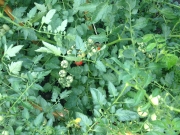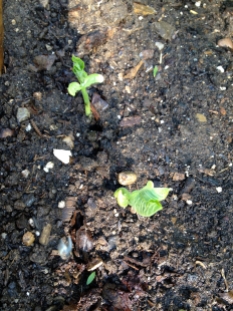A few weeks into my attempt at urban gardening, I already felt at home—comfortable. I firmly believe that certain activities were meant for us in this life. This belief makes sense considering every generation on my mother’s side of the family, prior to mine, has been involved in agriculture. As I delved into the world of urban gardening, I couldn’t help but draw connections to my roots. Unlike the expansive 168-acre mountain cocoa and coffee estate called La Laja in the West Indies, my current endeavor may be smaller in scale, but the sense of purpose resonates deeply.
At the age of 5, I was already initiated into the generations of hunters in my family with my very own slingshot. Mostly, we hunted birds—my brother was especially good at this, and we often reaped the rewards of our efforts. Returning to my great-grandmother’s base camp, we prepared our meals. These base camps served as temporary housing and storage for our harvest before transportation into town for sale at the market. We would sit down to feather the bird, lucky if we had more than one to share among ourselves. Once the initial layer of feathers was removed, we would burn off the fine feathers using heat from the embers of the wood-burning stove, then remove the innards. Often, we saved the liver, heart, and gizzard—delicious! Seasoned simply with salt, pepper, and then roasted using the open fire (the fire also seemed to have a seasoning all its own). This was a simple way of life and we had to live off of this land. A number of these camps dotting their way, until the final one almost at the top of the mountain.
I also assisted my great-grandmother in planting peas higher up the hill behind her camp. For generations, my family implemented a stepped-irrigation-agriculture system, resembling stairs cut into the side of a mountain. Crops thrived on the flat portions, benefiting from the natural runoff of rain and dew, creating a self-sustaining irrigation process.
Every time I return to my native country, setting foot on these lands is a must. It’s ironic; I immigrated to the US at the age of 9 and now consider myself American, too, particularly as a New Yorker. I’ve spent much of my time since then pursuing endeavors entirely unrelated to my initial upbringing. However, there’s an inexplicable connection to this rectangular plot of earth. Despite all my education and professional success, it resonates with the understanding that, beyond everything else, we will always find a way to be what we were meant to be.
I dug right in, weeding out, well, weeds and staking my small tomato plants. My mother was making a trip to the Terminal market in Canarsie (a great place for plants in Brooklyn). I asked her to pick me up whatever looked fresh and vibrant. She dropped off a tray mixed with sweet peppers (small sweet peppers), sweet basil, and rosemary. It was a good place to start; I didn’t want to overcrowd the plot to the point that my plants would have to compete for nutrients. This is also not the most productive way to stimulate abundant yields of fruit. The new garden director had water lines interspersed with standpipes installed every 10 feet throughout the garden, making watering very convenient. Within a few weeks, I began to see the rewards of my labor. Everything was growing nicely together. There was even an unoccupied space, and I decided to try sprouting some beans. Then I noticed another pleasant surprise from the rich layer of compost within my plot: a vine. At this point, I assumed it was a cucumber.
In mid-July, I attended a federal conference in Chicago. I had asked a friend who lived a couple of blocks away from campus to stop by and water the garden if needed. Upon my return, she informed me that the frequent rain had spared her the need for a visit. About a week and a half later, I drove onto campus at around 7:45 AM, early enough to check on my garden. I was shocked to find that it had almost doubled in size and become overgrown. I quickly headed to a home supply store, purchased some inexpensive wooden stakes, and set about managing the overgrowth. After addressing the larger weeds, my garden was finally ready for full production.
NEXT POST: FULL BLOOM












































